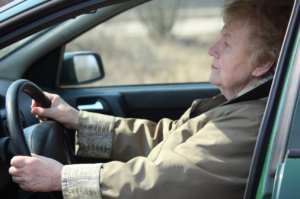
People are living longer, and are often independent and active well into their 80s and 90s. That’s a very good thing. But living longer doesn’t necessarily mean people can safely do everything they did when they were younger. This includes driving.
Our abilities change as we age, including our vision and reaction time. Medical conditions and medications can also affect driving ability.
Driving is one of those activities where there is little wiggle room. Once someone can no longer drive safely, he or she should not be on the road, putting themselves and others at risk.
Warning Signs for Elderly Drivers
It’s useful to ride along with your parent or other elderly loved one to observe his or her driving ability. Here are some things to look for when deciding whether parents or other elderly loved ones should continue driving:
- Have their driving habits changed? Do they still fasten their seat belts, use their turn signals and pay attention to the rules of the road? Do they tailgate or drift into other lanes? Do they drive too fast or much slower than traffic? Do they seem comfortable behind the wheel or are they tense or nervous?
- Do they have close calls when driving? Do other drivers honk at them frequently? Do they have normal reactions to stoplights and road signs? Do they have any trouble moving their foot from one pedal to the other? Do they confuse the brake and gas pedals? Do they judge distances well when changing lanes or pulling out into traffic?
- Do they have difficulty turning their head to back up or change lanes?
- Do they have any health conditions, such as vision or hearing impairments or dizzy spells that interfere with driving? Can they see road signs well? If they need glasses, do they wear them all the time? If you can, talk with your loved one’s doctor to get a better idea of health limitations.
- Are they taking any prescription or over-the-counter drugs that could affect driving ability? It’s a good idea to talk with a doctor or pharmacist about any possible drug interactions, as well as how drinking alcohol might interact with any medications.
- Have you found any unexplained dents or scrapes on the car, or damage to fences, garage doors, mailboxes or other fixtures where your loved one parks? Do they get lost going places they should know how to get to? Ask friends and family members what they have noticed about your loved ones’ driving.
- Have they received tickets or warnings for traffic violations? Have they been in an unusual number of fender-benders for which they were at fault?
The AARP and some AAA offices offer classes that can serve as a refresher for older drivers. But sometimes, health or other issues mean it’s simply not safe for them to continue driving.
Tips for Discussing Driving With Your Elderly Loved One
If you do think it’s time for your loved one to stop driving, there are resources from organizations like AARP and Caring.com. Tips include:
- Plan to talk to your loved one during a quiet time when you are both relaxed.
- Allow plenty of time for the conversation. Don’t rush through, and give everyone enough time to speak.
- Remember that if you have noticed your loved one’s driving has become a problem, he or she is probably already aware of it. Try to initiate the conversation with a question, asking how they are doing with their driving and following up by asking if they are finding it difficult to manage.
- Have realistic expectations. Understand your loved one many be angry and upset, and this could be the first of several discussions. Be prepared to take a break if things become heated.
- Use reflective listening, rephrasing what your loved one says to you, to better understand his or her feelings about the situation.
- As you discuss the matter, it might be helpful to ask directly what your loved one thinks he or she should do about driving.
Sources:
- AARP – 10 Signs That It’s Time to Limit or Stop Driving
- AARP – Driver Safety Program
- Caring.com – When to Stop Driving
- Caring.com – Driving Assessment for Seniors
- AARP – Talking with Older Drivers
- Caring.com – How to Talk to Elderly Adults About Giving up the Keys







































